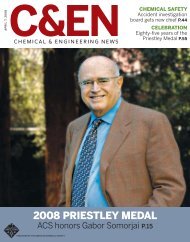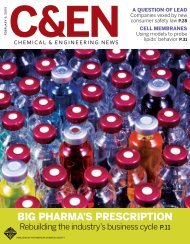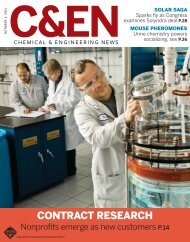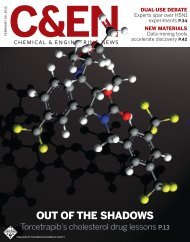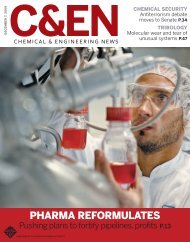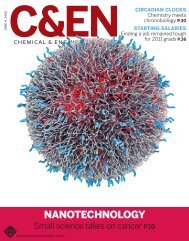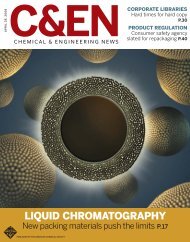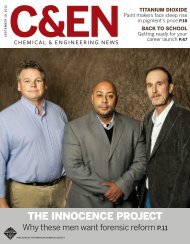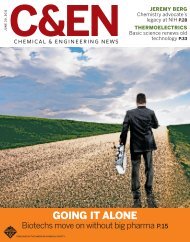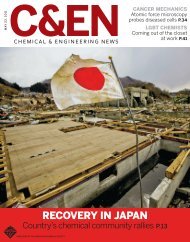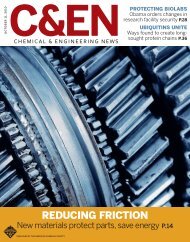Chemical & Engineering News Digital Edition - Institute of Materia ...
Chemical & Engineering News Digital Edition - Institute of Materia ...
Chemical & Engineering News Digital Edition - Institute of Materia ...
Create successful ePaper yourself
Turn your PDF publications into a flip-book with our unique Google optimized e-Paper software.
SCOTT J. FERRELL/CONGRESSIONAL QUARTERLY<br />
THE CHEMICAL INDUSTRY’S ability to<br />
determine how science is used to shape the<br />
national debate over product safety is being<br />
investigated by a key House committee.<br />
“Our committee intends to determine<br />
what influence the chemical industry<br />
yields over the scientific community and<br />
whether that influence is proper,” said Rep.<br />
John D. Dingell (D-Mich.), chairman <strong>of</strong> the<br />
House Energy & Commerce Committee,<br />
in a statement releasing an April 2 letter to<br />
the American Chemistry Council (ACC).<br />
The letter seeks a long list <strong>of</strong> documents<br />
from the U.S. chemical industry’s primary<br />
lobbying arm.<br />
In mid-March, Dingell’s committee<br />
also asked the Environmental Protection<br />
Agency for related documents and raised<br />
similar concerns that agency science is biased<br />
in the chemical industry’s favor. Both<br />
requests demand the information within<br />
two weeks from the dates <strong>of</strong> the letters.<br />
The genesis <strong>of</strong> the congressional investigations<br />
is ACC’s successful demand that<br />
EPA retroactively remove the views <strong>of</strong> the<br />
chairwoman who had overseen a peer re-<br />
GOVERNMENT & POLICY<br />
EPA SCIENCE<br />
INVESTIGATED<br />
House committee probe <strong>of</strong> INDUSTRY BIAS<br />
in agency review reaches former ACS president<br />
CHERYL HOGUE AND JEFF JOHNSON, C&EN WASHINGTON<br />
view assessment on a family <strong>of</strong> flame retardants.<br />
The agency struck the chairwoman’s<br />
views after the report had been published.<br />
The investigation, however, goes beyond<br />
this apparent influencing <strong>of</strong> EPA.<br />
Among the requested data from ACC are<br />
“all records <strong>of</strong> payments and communications”<br />
between former American <strong>Chemical</strong><br />
Society president William F. Carroll and<br />
ACC. Carroll served as ACS president in<br />
2005 and, as a member <strong>of</strong> the three-year<br />
presidential succession, was a member <strong>of</strong><br />
the society’s board <strong>of</strong> directors in 2004–06.<br />
The Energy & Commerce Committee<br />
is particularly concerned about “crosspollination”<br />
between Carroll’s role as the<br />
head <strong>of</strong> a society <strong>of</strong> chemical pr<strong>of</strong>essionals<br />
while at the same time serving as a chief<br />
industry proponent for the vinyl industry, a<br />
committee staff member says.<br />
Carroll has worked for Occidental<br />
<strong>Chemical</strong> continuously for nearly 30<br />
years and is currently the company’s vice<br />
president for chlorovinyl issues. He was<br />
identified in the House committee letter<br />
as an executive with the Vinyl <strong>Institute</strong>, an<br />
WWW.CEN-ONLINE.ORG 35 APRIL 14, 2008<br />
REDACTED<br />
EPA’s support<br />
<strong>of</strong> industry’s<br />
request to strike<br />
a peer reviewer’s<br />
comments has<br />
led to a House<br />
committee probe<br />
directed by Rep.<br />
John D. Dingell<br />
(right).<br />
industry group allied<br />
with ACC. But Carroll<br />
strongly denies<br />
this: “I was never an<br />
executive with the institute.<br />
Our company<br />
is a member, but I<br />
have never worked for<br />
them,” he says.<br />
Carroll has had a<br />
long relationship with<br />
ACC, however, and<br />
was acting managing director <strong>of</strong> ACC’s<br />
chlorine division for six months in 2006.<br />
And in 1994–96, he was a staff member <strong>of</strong><br />
the Chlorine Chemistry Council, an ACC<br />
subsidiary. Carroll says he was never on the<br />
payroll <strong>of</strong> ACC or the chlorine council.<br />
The committee is also seeking information<br />
on nine scientists with industry<br />
contacts who served on EPA review panels,<br />
as well as information on a law <strong>of</strong>fice and a<br />
public relations firm.<br />
ADDITIONALLY, the committee is exploring<br />
industry and science ties through information<br />
it is seeking about ACC’s relationship<br />
to the International Society for Regulatory<br />
Toxicology & Pharmacology and its<br />
journal, Regulatory Toxicology & Pharmacology,<br />
which is owned and published by<br />
Elsevier. The society, the committee staff<br />
member says, is funded by several corporations<br />
and associations, including ACC.<br />
Environmental and public health advocates<br />
have been critical <strong>of</strong> the journal. Jennifer<br />
Sass, a toxicologist with the Natural<br />
Resources Defense Council, says that in<br />
studies the journal publishes, previously<br />
reported toxic or adverse health effects<br />
from chemical exposure are downplayed,<br />
dismissed, or simply not mentioned. The<br />
journal includes mainly mathematical<br />
models and meta analyses <strong>of</strong> other published<br />
studies, she adds, and its editorial<br />
board includes attorneys who represent<br />
corporations.<br />
Dingell asked ACC for records <strong>of</strong> any<br />
payments to journal <strong>of</strong>ficials, but Gio B.<br />
Gori, editor <strong>of</strong> the journal, tells C&EN he<br />
has never received money from ACC and<br />
is paid for his editing work by Elsevier. “I<br />
don’t know why they’re investigating us,”<br />
he says. “We have nothing to hide.”<br />
At the heart <strong>of</strong> the investigation is<br />
Deborah C. Rice, a former EPA scientist<br />
and currently a toxicologist with the state<br />
<strong>of</strong> Maine, who chaired an EPA external peer<br />
review panel set up to conduct a toxicological<br />
review <strong>of</strong> polybrominated diphenyl



